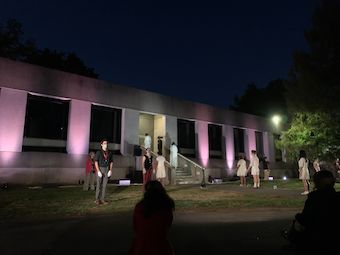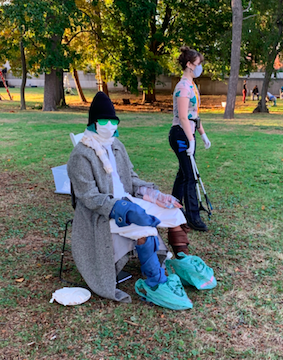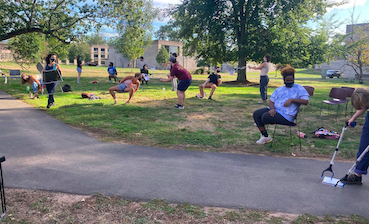
c/o Nathan Pugh
This semester, I have been hard at work—along with the rest of the University’s Theater Department—on creating a show that speaks to the present moment, to the conditions under which we are living. I auditioned for “SLABBER” in August because I was hoping to kick-start my theater journey at the University, but also because I was desperate to make theater at a time when the experience of a crowded theater feels so out of reach. I accepted the role of an “Assistant,” and last weekend I made my college performance debut. I interviewed Assistant Professor of Theater and “SLABBER” Director Katie Pearl to discuss the play in its many contexts and to grow my own understanding of what it means to be a part of this particular production.
The University’s Theater Department show, “SLABBER,” tells a story of contagion. “Our Lady,” the show’s main character, has been diagnosed with an unnamed illness. Her condition is caused by opposing forces, such as clean and dirty and security and insecurity, that live and interact within her. These forces swim through her blood and nestle in her joints.
“They want to stick together, but the moment they get close, they repulse each other, creating a constant state of charged opposition underneath my skin,” Our Lady explains.
Though she lives and breathes, she is in a constant state of discomfort. She worries she might be contagious, which is fitting for our current world.
Our Lady travels from place to place, conducting research with hopes of finding a cure. She needs help articulating her condition, which she calls “SLABBER.” Both the audience and Our Lady are masked, highlighting the uncanny similarities between this fantastical world and our current reality. Our Lady maintains a six feet distance from the audience to prevent spreading her mysterious illness, just as the audience sits six feet apart to prevent the spread of COVID-19.
Both actor and audience are learning how to navigate a world stained by disease. Our Lady’s task is to figure out how to connect with people without ever coming into contact with them, an issue we are all grappling with these days.
“I think that theater at its best is really a place for us to wrestle with and reckon with what’s going on in our societies and our lives,” Pearl said. “Sometimes a play allows us to escape reality, but other times it forces us to ask ourselves, ‘How do we be in this moment together?’”
In May, Pearl asked students what kind of play they thought should be put on during the fall semester. While some didn’t think a play about a global plague was a good idea, they did feel it was important to choose a show that would allow the community to acknowledge and connect with the current times.
“SLABBER doesn’t fight against the reality we are all in,” Pearl said. “It just accepts it and takes it one step further.”
Pearl first wrote and directed “SLABBER” in the mid-1990s, and various iterations of “studies” of the work have since been put on in Minneapolis, Austin, New Orleans, New York, and Chicago.
“We carry the fiction forward of how Our Lady is carrying out her research so that it can be landed exactly in the place the show happens in,” Pearl said.
On campus, “SLABBER” is specific to Middletown and its history. With help from student Dramaturgs Will Blumberg ’22 and Nathan Baron Silvern ’21, as well as ongoing input and writing from the creative team and the cast, Pearl was able to adapt the script to meet the needs of this specific time and place.
Since the script is written as a one-person play, Pearl expanded it to meet the needs of a larger ensemble. Instead of a singular Our Lady, the role is played by six different actors, all of whom portray the protagonist in their own way. How she moves and articulates her condition varies from actor to actor, which is what makes this particular production unique. No virus manifests itself identically within two bodies, and the ensemble’s portrayal of Our Lady depict this. This casting choice reflects the fact that genetic make-up governs our immune system, and bodily deficiencies are a vital factor for why some people contract more illnesses than others.

c/o Nathan Pugh
In this production of “SLABBER,” there are 12 “Assistants,” including me, who travel with Our Lady from place to place to help articulate her condition. Just like the Our Ladies, each Assistant forms their own personal connection to the plot, embodying the story differently. Pearl sees her production as a constantly reshaping form, responding to the people making it; the show finds its identity through the actors who perform it.
Due to the pandemic, the six Our Ladies and 12 Assistants are spread out across the expansive Center for the Arts (CFA) field rather than performing on a stage, much like the spreading of a disease. As cast members, we’ve learned to sustain our characters in the different weather conditions: glaring sun, relentless wind, pouring rain, as well as darkness since the only light we can depend upon is sunlight. The show opens with the solitary ringing of a bell; the lights do not fade out to let actors know when to begin. The natural world has become the stage.
In a traditional indoor theater, the dimming of lights signals the start of the production, and gives permission to the audience to drift off into their own world. The cloak of darkness hides audience emotion; no one can see tears well up in their eyes. The darkened theater is safe and an escape. But outdoors, on chairs set up across the field, the audience is exposed. Even with masks and distance, every feeling is observable by others. The audience members are watching the plot unfold in front of them, while acknowledging the other viewers in their peripheral vision. They are experiencing each other’s body language in real time. Perhaps this is what so many of us all have been craving: an experience that forces us to externalize our emotions and vulnerabilities, together. Maybe this is how we can connect without ever leaving our chairs.
The “SLABBER” script opens with an Assistant unwrapping their Our Lady, but because of the contagion they cannot touch her. Instead the Assistant uses mechanical grippers to strip Our Lady down to her most exposed form. Pearl explains that the grippers function as a motif of the play, forming the base layer of the storytelling.
“I do well with helpful constraints,” Pearl said. “Like when somebody starts putting a box around me, I start getting really interested, and so a good example is the grippers. Right off the bat I knew that actors couldn’t touch each other, and yet the play starts with the Assistants basically undressing/unwrapping the Our Ladies, so how are we gonna do that? Incorporating the grippers becomes kind of key to the storytelling of contagion and not being close that is both part of the play and audience’s reality. It’s a nice moment of connection between fiction and reality.”
In many societies, being sick has historically carried a connotation of impurity. When the Our Ladies first begin keeping track of their condition, they make many lists. The first draws attention to substances of animal origin used in the earliest stages of soap-making.
“The word ‘soap’ comes from ‘Mount Sapo,’” explains the Our Ladies. “The ashes and the grease of animals from the sacrificial fires from the temples atop Sapo Hill mixed with the rain, making soap, which ran down the hill giving this woman a washing day bonus, allowing her to comment to her friend: ‘My wash is cleaner than yours.’”
Cleanliness lets us compare ourselves to others in a way that emphasizes our status. The cleaner we are, the more likely society will accept us. Consequently, the dirtier we appear, the more likely society will shun us.

c/o Katie Pearl
“SLABBER” extends beyond the borders of the CFA field. In a recent “Talk It Out,” a virtual conversation about “SLABBER,” University students and faculty engaged in conversation about isolation and humanity of disease. Professors Anthony Hatch and Frederick Cohan, experts in disease, sociology of contagion and the human impact on the environment, led the conversation. The title of the event, “Dis/ease: Contagion and Pandemics in Our World and Its Stories” literally breaks down “disease” into “dis” and “ease,” contributing a level of humanity to the term. “Disease” does not only manifest itself physically, but it affects us emotionally. In other words, “unease” not only exists inside our bodies, it lives in society, too. When we are without ease, we are unsure of how we fit into our environment.
Hatch and Cohan broke down this term of “dis/ease” to speak about COVID-19 as it relates to current culture. When someone tests “positive” for the virus, they are denigrated. While there is a fear of getting sick and having long term health conditions, there is an even greater fear of being perceived as unclean and perceived as inferior in society. This is where the symbolism of soap becomes vital to the show: it is the supposed “cure” of our impurity.
“Soap acts as an emulsifier between water and dirt,” Our Lady explains.“Soap allows the water and dirt to stick together, which decreases the surface tension on the skin, and lets the dirt wash away.”
At the event, Hatch similarly spoke to the transformative power of cleaning.
“Cleaning is an activity that is designed to move us to a state of purity,” Hatch said.
When we physically clean off dirt, we are also washing away our shame, “leaving, theoretically, a clean surface,” Our Lady says.
The show also took advantage of the University’s undergraduate research as material for dialogue. In her senior thesis, Christine Zheng ’20 articulates the meaning of one artifact uncovered by the Our Ladies. Zheng explains how in the Indian caste system, the people at the bottom of society—often the original inhabitants of the country—are referred to as “Untouchables.” Despite their nativeness to the land, they have been cast out of society.
“This is where we find the origin of the word ‘outcast,’” Our Lady summarizes in the show. “Literally, one who has been expelled from his caste.”
Middletown itself has its own history of expelling inhabitants off of land. The University’s campus was once originally inhabited by the tribe of the Wankgunk people. As colonists took over the land, these Indigenous People were left with only a small sliver of what they once had. Like the Untouchables, they were made outcasts in a place they called home. The colonizers scrubbed the land, like soap on dirt, to brighten what they deemed the “dark corners of the earth” as they tried to “advance” civilization.
“SLABBER,” with its multiple definitions (slabber can mean to dribble at the mouth but is also the name of a machine in soap making factories that cuts soap into slabs), presents dis/ease in a way that makes the audience reflect on the dark history of their home of Middletown. This research presentation is meant to make viewers think about their role in relation to their environment—something that is easy to forget, especially on the University’s campus.
“The play has opened up the history of Middletown, that’s been a lot of the part of the research of it,” Pearl said. “I think that all of us as a cast and a team were like ‘wow.’ We just just don’t know that much about Middletown.”
The next time you sit on Foss, study in Olin or stroll down to the Connecticut River, think about where you are standing in relation to those who stood there before you. We are never truly alone; not even soap can scrub away history.
“I hope the audience walks away thinking about how we can truly know another person, what connection really means, how we project and assume and make assumptions about people walking by us based solely on external factors of class, race, ableism,” Pearl said. “I hope the show makes them think about the history and idea of dirty-ness and cleanliness are really social constructs that keep a certain group of people in power.”
Here and now, “SLABBER” gives us the space to think about our role in relation to others and how the pandemic is deepening the intense socio-political divide that has defined America since its founding. However, “SLABBER” has also made room for closeness and understanding. For the cast, every rehearsal ends the same way: we form a huge circle and hug ourselves while looking at the cast surrounding us. We’ve learned to feel close to each other, physically and emotionally, without ever coming into contact.
Abby Glassman can be contacted at aglassman@wesleyan.edu.
1 Comment
Bigseoonline.com
Thank you, a very interesting note. Post gave it some thought.